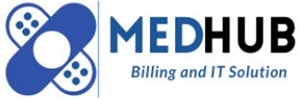10 best medical billing services are available at MedHub. Are you looking for the best medical billing services USA? One can only imagine all the difficulties the healthcare sector have to face. When people ask themselves what they do at work, most individuals believe that they just work to treat patients, but fundamentally, that is not the only thing they do. Surprisingly, it has been found that doctors and other healthcare staff spend about more than half of their working hours on clerical work.
Given that they spend so many hours on these jobs, they are likely to fail at delivering quality patient care. Consequently, affecting a patient’s health. Many healthcare organizations outsource medical billing services in USA companies to rectify their medical billing processes and optimize revenue cycle.
These companies assist in minimizing billing errors, avoid staff exhaustion and provide many other advantages. Medical billing is one of the most outsourced services in American healthcare systems. You are at the right place, for all the healthcare providers seeking out medical billing services or insurance firms searching for medical billing companies in USA, we are here.
This article lists 7 of the best medical billing services you should know about, to improve your payments process and boost your revenue.
MAJOR HIGHLIGHTS
- Affordable medical billing solutions enhance the health sector’s effectiveness and accelerate the payment of charges.
- These include professional billing services, as outsourcing can help providers focus most of their time on patients.
- It involves coding services and submitting claims to insurance companies.
- Key considerations include billing accuracy, transparent pricing, experience, and technology integration.
- Good communication and responsiveness are essential for smooth operations.
- Best Medical Billing Services should be scalable and customizable to fit practice needs.
- Strong data analytics and reporting tools are important for financial insights.
- A smooth onboarding process is crucial when switching billing companies.
- Top benefits include reduced administrative burden, fewer errors, lower costs, and better compliance.
WHAT IS MEDICAL BILLING?
Medical billing is the process of submitting bills to insurance companies so the doctors and the hospital can get paid according to the services they provide. It has special codes to show the type of diseases and treatments the patient is expected to receive.
The billing company passes on these codes to the insurance company for checking that the payments are being collected. It ensures that healthcare providers are paid appropriately, quickly, and in accordance with the insurance requirements.
Medical billing is beneficial as well as complex because it facilitates access to healthcare services and ensures that healthcare providers receive their payments.
How Medical Billing Works
Medical billing and coding are crucial in the health facility. They facilitate payment against health services provided by providers and practices. This means that medical coders decode what the doctor has prescribed, to determine what kind of care was provided. They also apply some codes that indicate what was done in terms of treatment or tests.
Coders and billers work with doctors, nurses, and other healthcare workers. They must be completely knowledgeable about medical terms to do their job correctly. Coders and billers often work together to make sure everything is in place.
KEY FACTORS TO CONSIDER BEFORE CHOOSING A MEDICAL BILLING COMPANY
There is nothing as important in regards to selecting the right medical billing company in the USA for hospitals and providers. Effective medical billing ensures that provided health service deliveries are billed appropriately, claims are submitted on-time, and receivables are processed timely.
However, not all the medical billing companies are the same, and, at times, practices or clinics might have some reason to seek another company. Let’s explore some key factors to consider before selecting a medical billing company:
1- Billing Accuracy and Compliance:
Whenever a person has to select a medical billing company, he must ensure that the company provides excellent medical billing services and procedures. That just means that providers and practices have to get paid what they owe to be paid. It also assists them in adhering to the codes and billing regulations.
What to Look For:
- Low Claim Denial Rate: A good medical billing company should have lesser claims that get denied. This proves they are good at handling their billing processes.
- Coding Skills: The company needs to be proficient in medical coding so that all the services should be billed correctly.
- Following the Rules: Ensure that the company follows the healthcare rules. Due to this, they can shield themselves from audits and legal issues.
2- Transparent Pricing and Fees:
Medical billing companies in USA either take a percentage of the amount they can recover or set a monthly fee. Knowing how much they charge and ensuring these charges are budget friendly, is important.
What to Look For:
- Easy-to-understand Prices: The company should clearly explain how they charge and list all the fees.
- Competitive Rates: Compare their prices with others to ensure you get a fair deal.
- No Hidden Charges: Ensure no hidden fees or unexpected costs are in the contract.
3- Experience and Special Skills:
Medical billing can be tricky, so it is important to choose an experienced company. You need to ensure that they understand how to address the requirements of your healthcare practice setting.
What to Look For:
- Experience in Your Field: Find a company that has worked with healthcare providers like yours, whether it’s a provider’s office, a clinic, or a practice.
- Successful History: Check how well they have done billing for others like you.
- Understanding of Rules: Ensure they understand the policies and norms for your kind of healthcare, to serve you with the best medical billing services.
4- Technology and Medical Billing Software:
The tools and softwares, a billing company possesses are very important determinants of the speed and efficiency of your billing. You should always find out if their technology is compatible with what they have to do in the company.
What to Look For:
Works with Your EHR: Ensure the billing company’s software seamlessly integrates with your electronic health records (EHR).
- Uses Smart Tools: Find out whether they provide medical billing services with the help of automation and, in particular, Artificial Intelligence (AI) to make the billing process quicker and more accurate.
- Keeps Data Safe: The medical billing company’s technology keeps patient information safe and follows the security rules strictly.
5- Communication and Responsiveness:
Good communication and quick responses are key to running a smooth billing process. Check how the billing company communicates and how well they address your concerns.
What to Look For:
- Accessibility: The billing company should have easy-to-reach customer support and responsive communication methods.
- Timely Responses: See how quickly they respond to questions, problems, and concerns.
- Regular Updates: Find out if they regularly update claims and financial reports.
6- References and Testimonials:
The opinions of other healthcare providers who have worked with billing companies can help one learn more about the capability and effectiveness of billing companies.
What to Look For:
- Client References: Ask for referrals from current clients and contact them to get their experiences about the medical billing services in USA.
- Online Reviews: There should be opinions from other healthcare providers that have engaged with the company through customer testimonies or approval ratings on social media market websites and rating sites.
7- Scalability and Customization:
Think about whether the billing company can grow alongside your healthcare practice. It should be flexible enough to adapt to your changing needs and offer customized solutions.
What to Look For:
- Scalability: You should choose a billing company that can expand your practice and does not compromise the quality of the company’s service.
- Customization: Make sure the company can adapt its services to your needs, choices, and preferences.
8- Data Analytics and Reporting:
Strong data analytics and reporting tools are necessary for monitoring your healthcare practice’s financial performance. Thoroughly go through the reporting features and analytics provided by the billing company.
What to Look For:
- Real-time Analytics: Check if the billing company offers real-time access to important performance indicators (KPIs) related to revenue and claims.
- Custom Reports: Ensure they provide customizable reports that meet your specific reporting needs in the process of medical billing.
- Insights for Improvement: Evaluate whether the company offers actionable insights based on data analysis to help improve revenue collection.
9- Transition and Onboarding Process:
Switching to a new billing company can be complicated and risky. Assess the onboarding and transition support provided by the billing company to ensure a smooth changeover without interrupting your revenue cycle. It will ensure the best medical billing services.
What to Look For:
- Onboarding Assistance: Check if the billing company offers thorough onboarding support, including data migration and training.
- Transition Plan: Make sure there’s a clear transition plan to reduce any potential disruption to your revenue cycle.
- Timelines: Confirm the expected timelines for the transition process. It will ensure the best medical billing services in USA.
10- Track Record of Success:
Undoubtedly, it is crucial to assess various successes achieved by the billing company and its capabilities to meet its obligations regularly. Large billing companies with strong feedback for healthcare providers indicate reliability.
What to Look For:
- Case Studies: Ask for more case studies and success stories the billing company has made with other healthcare providers.
- Longevity: Another reason is that it is important to pay attention for the company’s experience; it can be referred to as its credibility.
- References: Go back to references and testaments to make certain that clients feel the firm offered the best medical billing services in the USA.
BENEFITS OF MEDICAL BILLING SERVICES in USA:
1- Minimize Administrative Workload:
Most healthcare providers do not have a billing department; hence, billing is normally performed by a secretary skilled in billing. This can result in errors and delays in patients’ treatment. Also, due to having in-house abilities, there will be a lot of expenses.
Medical billing outsourcing relieves the burden on your staff, and time can be effectively dedicated to patient care. It may reduce expenses, enable the provision of more patients, increase income, and enhance the quality of patients’ treatment.
2- Reduces Billing Errors:
Skilled and trained medical billers know a lot about submitting claims correctly. Medical billing companies ensure their staff undergo thorough training and clear assessments to prove their knowledge.
While working, these billers focus on getting things right and submitting timely claims. They ensure lowering the number of rejected claims by checking for mistakes and correcting them before the claims are sent to the insurance company.
3- Saves Money:
Perhaps the most common motive that hospitals opt for outsourcing is the reduction of costs. The advantages of outsourcing include that practices do not have to pay high costs for employees’ wages, training and other benefits.
They no longer have to worry about purchases, such as office supplies, furniture, or equipment. Many hospitals select specialized providers to obtain high-quality service at low costs. With different pricing options (like per transaction, a percentage, or full-time equivalent), clients can choose what works best for them.
4- Keep Patient Information Safe:
Medical records are 10 to 20 times more valuable than other types of digital data. When you choose MedHub Billing services in USA, experts will work hard to protect patient information and ensure a very low chance of a data breach. By choosing MedHub Billing, you can trust that patient information will remain secure, allowing you to focus on providing quality healthcare.
5- Improve Patient Satisfaction:
Outsourcing billing makes patients happier! When your office staff has less work to do, they can focus on important tasks, making things run more smoothly. This also helps them feel better at work. Patients can easily talk to MedHub Billing’s friendly customer service team, who are always patient and kind when answering questions.
6- Accelerates Cash Flow:1
Outsourcing medical billing is advantageous to hospitals as it assists them in maintaining a steady cash flow and leads to faster follow-up on payments, no matter their staffing situation. Hospitals can accelerate billing and save cash by leaving it to a specialized company.
7- Prioritizes Patient Care:
Serving as a provider and dealing with administrative responsibilities is very challenging. For example, answering the questions and dealing with the billing activities can decrease inbound employee performance and outcomes.
By availing the medical billing services in USA, providers can focus more on patients. The focus not only aids in generating more revenues but also develops a loyal patient base. Healthcare professionals can then avoid the hassle of dealing with insurance and rules, allowing them to concentrate on what they do best.
8- Ensuring Billing Compliance:
Being compliant with GDPR and HIPAA is necessary. You will likely face fines or even some legal suits if you fail to do so.
By partnering with HIPAA-compliant medical practices, you guarantee your data and processes are protected against penalties and legal actions.
MEDICAL BILLING SERVICES USA- AFFORDABLE MEDICAL BILLING SOLUTIONS
1- Precision in Medical Coding Services:
Accurate medical coding is necessary for proper medical billing and documentation. These services ensure that medical practices are turned into standardized coding, which helps reduce mistakes, improve compliance, and prevent expensive errors.
For small practices, this means they will have fewer rejected claims and can earn more steady income.
2- Revenue Cycle Consulting:
Revenue cycle consulting offers expert advice to help you improve your revenue cycle management.
Consultants work with you to find areas that need improvement and help you make more money while increasing efficiency and ensuring financial stability. Small practices in the USA can get much from personalized advice on enhancing their billing processes. So, they should avail medical billing services in USA.
3- Compliance Audit:
Regular compliance audits ensure your practice follows healthcare rules and standards.
These audits help prevent legal problems, ensure accurate billing, and keep you in line with regulations. They protect small practices from expensive fines and investigations by ensuring they bill correctly and ethically.
4- Denial Management:
Dealing with denied claims can take up a lot of time and resources. Denial management services help identify, analyze, and fix these denied claims. They aim to lower the number of denials, recover lost revenue, and improve the chances of claims getting approved.
For small practices, this means steadier cash flow and fewer headaches with paperwork, after getting medical billing services in USA.
5- Revenue Cycle Consulting:
Revenue cycle consulting offers expert advice to improve your entire revenue management system.
Consultants help find ways to make things better and boost your income, making your practice more efficient and financially stable. Small practices in the USA can benefit from customized tips on improving their billing processes.
6- Advanced Technology Integration for Billing:
Advanced billing software and technology can automate your billing tasks, making them more accurate and keeping your data safe.
For small practices, everything runs smoothly, with fewer mistakes and secure billing processes. These advanced technologies also offer helpful analytics and reports, which can guide you in making smart choices for your practice.
7- Effective Claim Submission Process:
Having an efficient claim submission process can significantly boost your revenue. By submitting claims on time, tracking their status, and following up, small practices can improve their chances of getting claims accepted and receiving reimbursements faster while reducing denials.
This service is essential for keeping a steady and reliable income so you can focus more on caring for your patients and less on paperwork.
A QUICK LIST: 7 BEST MEDICAL BILLING COMPANIES
1. MedHub Billing
2. CareCloud
3. Kareo
4. DrChrono
5. eClinicalWorks
6. AthenaHealth
7. CureMD
1. MedHub Billing:
MedHub is a leading medical billing company. They offer a complete medical billing services in USA that helps healthcare providers get more money while spending less. This allows doctors and nurses to focus more on caring for their patients. Their electronic billing software is fast that keeps everything accurate.
What makes MedHub stand out is its hands-on management. They handle the entire billing process, from checking if patients’ insurance is good to ensuring claims are correct. They have a high success rate, with over 98.5% of claims getting approved on the first try.
Their skilled team quickly addresses any denied claims and keeps healthcare providers updated. MedHub offers services like Revenue Cycle Management, Medical Coding, Credentialing & Enrollment, A/R Management, Medical Billing Service, Practice Billing Audit, and Front Desk Management.
Overall, MedHub is an excellent choice for healthcare providers who want a reliable billing service that improves their finances while letting them focus on patient care.
Key Offerings:
- Revenue Cycle Management
- Medical Coding
- Credentialing & Enrollment
- A/R Management
- Medical Billing Service
- Practice Billing Audit
- Front Desk Management
2. CareCloud:
CareCloud is another important company that has helped the healthcare industry a lot. They started in 1999 and now help many healthcare providers. They work hard to reduce denied claims, fix mistakes, and protect patient information. CareCloud offers many services, including managing the money for healthcare, analyzing health data, and clinical coding.
Key Offerings:
- Medical Billing
- EHR software development
- Robotic Process Automation
- Practice Management
3. BellMedEx:
BellMedEx is a top medical billing company that helps healthcare organizations reach their goals. They make things easier for your team and help improve your finances.
Their hardworking team is dedicated to improving things for patients and healthcare providers. BellMedEx offers medical billing services in USA like submitting claims, coding, and checking insurance. With Kareo handling your billing, you can relax and focus more on patient care.
Key Offerings:
- Medical Billing
- Mobile Apps
- Telehealth
- Practice Management Solutions
4. DrChrono
DrChrono is a good medical billing company in the USA. They offer a wide range of healthcare services, including medical billing, managing money for healthcare, and helping with practice organization.
Their skilled team works hard to reduce mistakes with claims and ensure that doctors get paid quickly, whether in small clinics or big hospitals. Many healthcare providers trust DrChrono for their dependable services.
Key Offerings:
- Medical Billing
- Mobile EHR Solutions
- Patient Portal
- Telehealth
5. eClinicalWorks
eClinicalWorks is a good company that offers the best medical billing services to help different healthcare practices increase revenue. They utilize specific cloud-based applications to maintain the broad spectrum of organizational requirements, such as patient charts, invoicing structures, and general practice flow. If you have been searching for a professional medical billing company, eClinicalWorks is a good choice.
Key Offerings:
- Medical Billing
- Interoperability
- Patient Engagement
- EHR Development
6. Athenahealth
AthenaHealth is a leading medical billing service that started in 1997. They have a big team of over 7,000 employees who are good at helping with different healthcare services, like managing claims.
However, they don’t just focus on billing; they also help with practice management and keeping patients engaged. Their services help employees work better and help healthcare providers take better care of patients and improve their finances.
Key Offerings:
- Medical Billing
- EHR Development
- Patient Engagement
- Revenue Cycle Management
7. CureMD
Since 1997, CureMD has been helping the healthcare community with smart medical services. They are known worldwide as one of the best medical billing service providers because they offer flexible solutions for managing money in healthcare. Their services cover everything from coding to managing the money owed to the practice.
What sets CureMD apart is the integrated EHR, practice management solution, and patient connect tools. This is because, through this system, healthcare providers can handle almost everything under one roof.
Key Offerings:
- Medical Billing
- Custom Software Development
- Care Management Platform
- Patient Portal
FINAL THOUGHTS
In conclusion, healthcare providers must select the best medical billing service in USA to improve efficiency and revenue. The top medical billing companies for 2025 provide comprehensive solutions to improve billing accuracy, efficiency and collection.
Outsourcing benefits include having healthcare professionals perform their duties rather than worrying about billing, which involves dealing with many numbers that a professional expert cannot handle. This is about billing accuracy, transparent price structure, and strong technology.
Choosing the right partner healthcare practices for the best medical billing services in USa will enable timely reimbursements, lower administrative hassles, and quality patient service delivery.
FAQS
Q1: What are the best medical billing services that offer affordable medical billing solutions for small practices?
MedHub Billing is a great option for small healthcare practices. They offer affordable and reliable medical billing services in USAthat help manage money better. This way, doctors and nurses can spend more time caring for patients, while MedHub ensures all the billing is done correctly and quickly.
Q2: How can I find affordable medical billing solutions among the top-rated medical billing services?
Compare pricing from different companies and look for clear pricing models. Check for discounts or bundled services to lower costs.
Read reviews from other small practices for insights on satisfaction levels. Ensure the billing service’s technology integrates well with your systems to avoid unexpected expenses.




